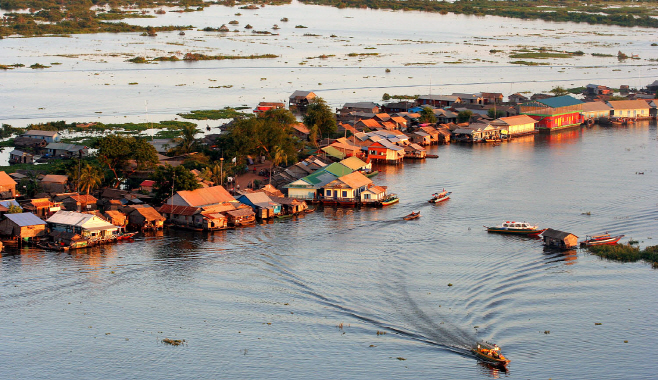
Understanding the Serious Threats to Food Security in Korea and Beyond
Hello there! Whether you're living in Korea or simply have a keen interest in its affairs, understanding the current environmental issues that affect food security is crucial. Recently, news from Cambodia highlights the alarming decline in fish catches, a concern that echoes across borders. This topic is relevant not just for locals but for expatriates and foreigners who rely on stable food sources.
The decline in fish populations in Tonle Sap Lake, Cambodia's largest freshwater lake, may not seem directly related to life in Korea. However, it sheds light on global patterns that impact food supply chains, international trade, and environmental conservation—issues every expatriate should be aware of.
🌏 What's happening in Korea? (Quick overview)
Recently, Cambodian fisheries have seen a drastic decline in their fish catch due to factors like rapid population growth and unregulated dam construction. With 70% of Cambodians relying on fish for protein, this decline could lead to a severe food crisis. Similar crises could emerge in Korea if fish populations in surrounding waters face similar challenges.
💡 Why this matters for foreigners? (Impact analysis)
As more foreigners settle in Korea, understanding the interconnectedness of global food supply issues is essential. A decline in fish imports from Southeast Asia, due to ecological changes or political issues, may lead to increased prices and reduced availability of fish in Korean markets, affecting dining choices and living costs.
📌 How to take advantage of this? (Step-by-step guide, if applicable)
Foreigners living in Korea can diversify their diet by exploring Korea’s vast array of local delicacies that do not rely heavily on fish. Here’s how you can adapt:
- Explore local markets for fresh produce and meats.
- Try unique Korean dishes that emphasize vegetables, such as bibimbap.
- Connect with local farmers through community-supported agriculture (CSA) programs.
🇰🇷 Understanding Korea's system (Cultural & bureaucratic insights)
Korea has a rich tradition of fishing, but the declining health of fish stocks is a pressing issue. Understanding local laws regarding fishing quotas and environmental protection can help foreigners better engage with the community and support sustainable practices. Familiarize yourself with resources like the Ministry of Oceans and Fisheries for updates on regulations.
🌟 Tips for foreigners living in Korea
Adapting to life in Korea can be made easier with the following tips:
- Stay informed about local food sourcing and sustainability practices.
- Engage with local environmental organizations to learn about conservation efforts.
- Join community workshops focused on sustainable living and cooking classes that highlight local ingredients.
🔮 What's next? (Future trends & additional insights)
As environmental issues like fishery decline become more pressing, future efforts may include international collaborations to develop sustainable fishing practices. Staying abreast of such initiatives can empower foreigners to make informed choices and adapt to changing dynamics in local food supply systems.
🇰🇷 Learn Korean from this Article!
Improve your Korean language skills with these key phrases from the article:
🔤 Korean Phrase 1: "어획량 감소" (Eohwaegyang gamso)
🔤 Pronunciation: Eo-haeg-lyang gam-so
🔤 English Translation: "Decline in catch"
🔤 Usage Tip: This phrase can be used in discussions about fishing and environmental concerns.
🔤 Korean Phrase 2: "식량 위기" (Sikyang wigi)
🔤 Pronunciation: Sik-lyang wi-gi
🔤 English Translation: "Food crisis"
🔤 Usage Tip: Use this term when discussing food shortages or supply challenges.
🔤 Korean Phrase 3: "어업 활동" (Eocheop hwaldong)
🔤 Pronunciation: Eo-eob hwal-dong
🔤 English Translation: "Fishing activities"
🔤 Usage Tip: This phrase is relevant when talking about the fishing industry and local practices.
🙋 Essential FAQs for Foreigners
Can foreigners participate or apply?
Yes, foreigners living in Korea can participate in various programs focusing on sustainable fishing practices. Check local community boards for engagement opportunities.
Do I need to know Korean for this?
While Korean proficiency is helpful, many organizations provide translations or have English-speaking staff to assist expatriates.
Where can I find official details?
Visit the Ministry of Oceans and Fisheries website for official information on regulations, initiatives, and community events.
Understanding these issues enriches your experience in Korea and empowers you to engage with the local community effectively.
📱 Get the BeraKorean App & Stay Updated!
Want to improve your Korean skills and stay informed about life in Korea? Download the BeraKorean app for exclusive content:
- 📱 Android: Download on Google Play
- 🍎 iOS: Download on App Store
📺 Follow us on BeraKorean YouTube for Korean lifestyle & language content!
🌏 Visit berakorean.com for more updates, news, and insights on living in Korea.
🔗 Read the Original Korean Article
Want to dive deeper? Check out the original article here:
📢 Tags
#KoreaNews #LifeInKorea #ForeignersInKorea #KoreaOpportunities #KoreaLiving #LearnKorean #KoreanLanguage